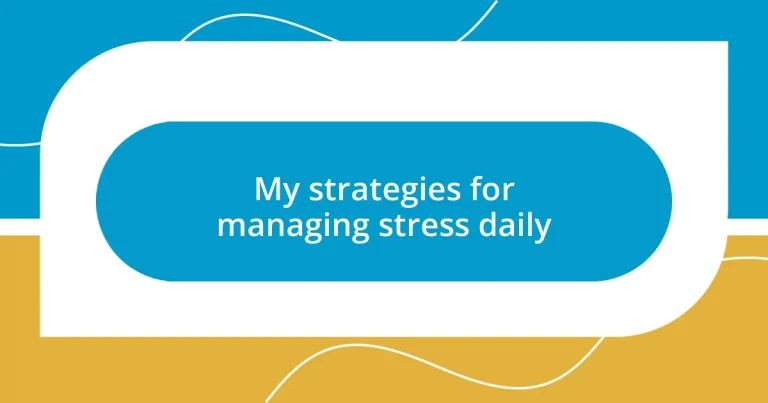Key takeaways:
- Recognizing personal stress triggers, such as time constraints and overcommitment, is essential for effective stress management.
- Implementing structured time management techniques, like the Pomodoro Technique and daily reflection, can enhance productivity and reduce stress.
- Building a supportive network and regularly evaluating stress management strategies enables resilience and adaptability in navigating daily challenges.
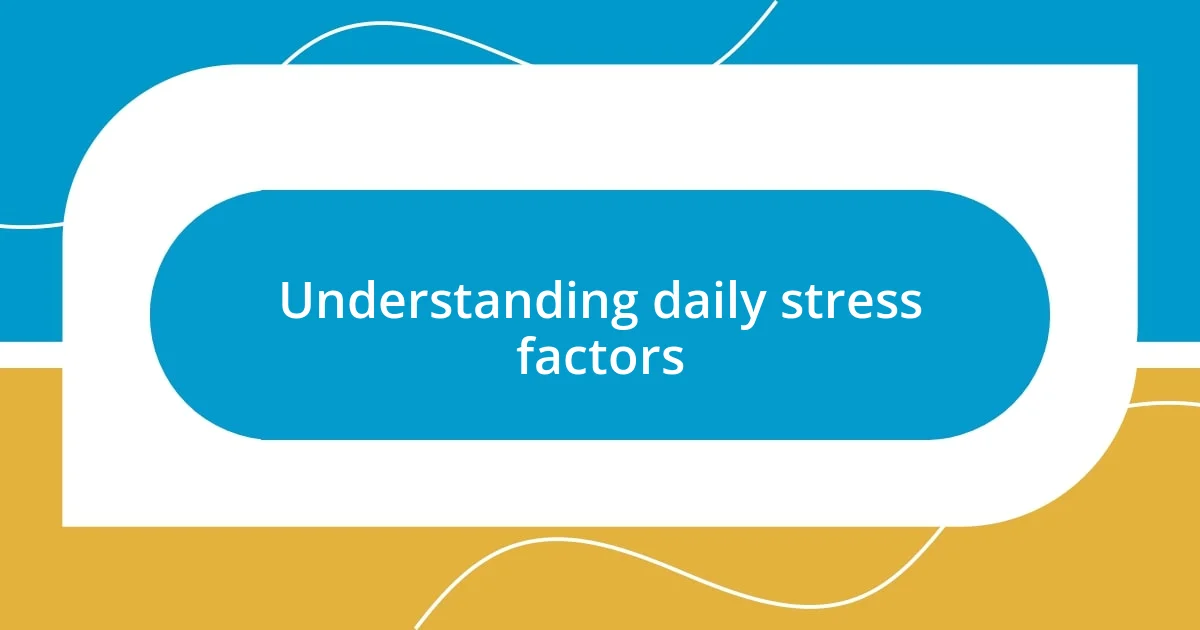
Understanding daily stress factors
Daily stress factors can creep up on us in various forms, often catching us off guard. For instance, I vividly remember a day when my phone wouldn’t stop buzzing with notifications, each one demanding my immediate attention. It made me wonder: how often do we allow external pressures to invade our mental space without even realizing it?
Life’s rhythm is full of obligations that can turn into stressors, whether it’s work deadlines, family responsibilities, or social commitments. One time, while managing a particularly busy week, I found myself overwhelmed by juggling meetings and commitments. I asked myself, “What can I drop to make this easier?” Identifying priorities became crucial, and it made me recognize that not everything on my to-do list was equally important.
Moreover, it’s fascinating how our inner dialogue can exacerbate stress. I often catch myself overthinking simple decisions, spiraling down a rabbit hole of what-ifs. It really brings to light the idea: Are we sometimes our own worst enemies in the stress game? Understanding these daily stress factors is key to finding effective ways to manage them, wouldn’t you agree?
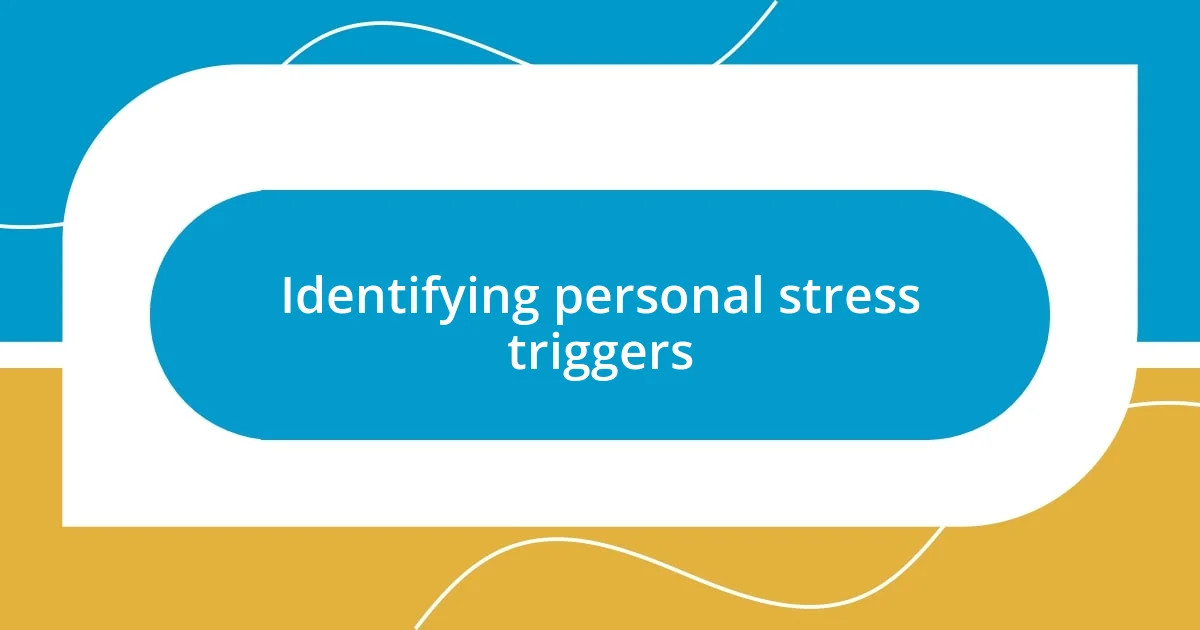
Identifying personal stress triggers
Identifying my personal stress triggers has been a game changer for managing my daily stress. There was a time when I would rush into the day without a clear understanding of what upset me. One day, as I sat in traffic and felt my frustration rising, I realized that not only the commute but also my constant need for control played a significant role in heightening my stress. I began to pay attention to moments when I felt overwhelmed, jotting down the specific situations that led to my discomfort.
To help clarify this process, here are some common personal stress triggers I discovered:
– Time constraints: Rushing to meet deadlines can quickly elevate my stress levels.
– Unrealistic expectations: Setting high standards for myself has often led to feelings of inadequacy.
– Conflict in relationships: Tension with loved ones can create a lingering sense of anxiety.
– Overcommitment: Saying yes to every invitation leaves me drained and irritable.
– Change in routine: Disruptions in my regular schedule can throw me off balance.
Reflecting on these triggers has allowed me to navigate my stress more effectively, leading to the implementation of healthier coping strategies.
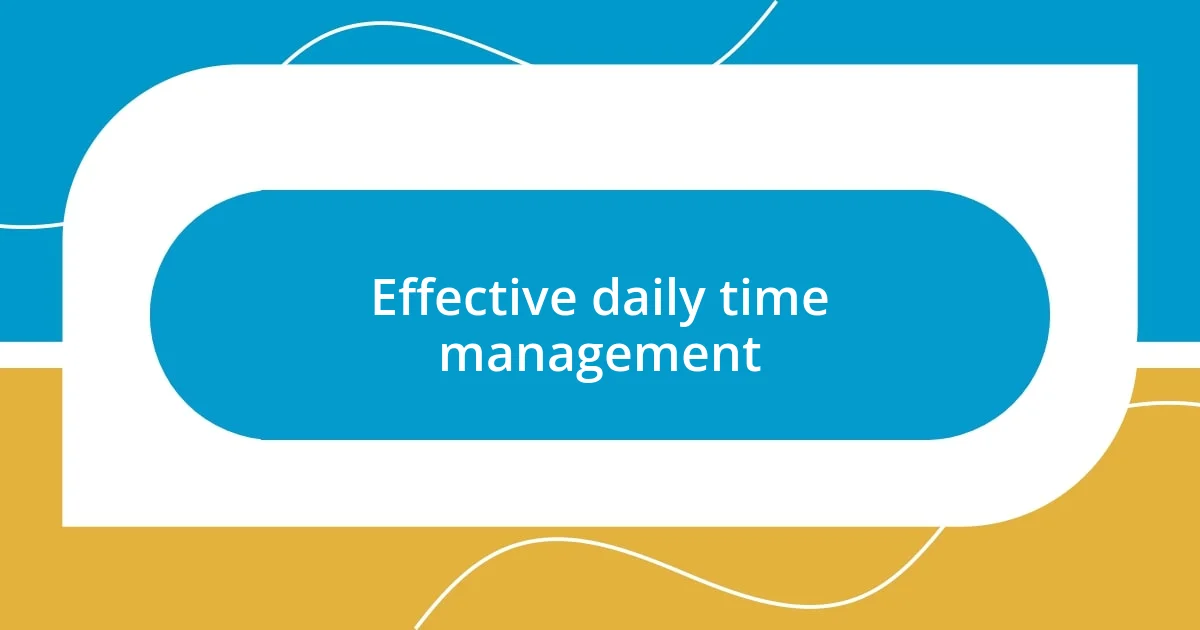
Effective daily time management
Effective daily time management is something I’ve cultivated over time. I remember when my planner was a chaotic mix of colors and scribbles—I was lost in a sea of tasks. I decided to sit down one weekend and completely revamp my approach. Instead of overwhelming myself with every single task, I focused on organizing my day into blocks of dedicated time. This practice allowed me not only to see what needs to be done but also to give myself the gift of uninterrupted focus on one task at a time.
There’s something incredibly fulfilling about planning, isn’t there? I now use a simple technique called the Pomodoro Technique, where I work for 25 minutes and then take a 5-minute break. It enhances my productivity while preventing burnout. I vividly recall the first time I used this method; I was shocked at how much more I accomplished in such a short time. The rhythm of work and rest helped reduce my stress by turning what once felt daunting into manageable intervals.
Finally, I believe reflection is a key part of effective time management. Each evening, I take a moment to evaluate what went well and where I can improve. It’s these small adjustments that continuously enhance my efficiency. One night, after a particularly productive day, I realized that blocking off time for creative thinking had sparked new ideas. Essentially, being intentional with how I manage my time not only reduces stress but also nourishes my creativity, don’t you find that interesting?
| Time Management Strategy | Description |
|---|---|
| Task Batching | Grouping similar tasks together to minimize context switching. |
| Pomodoro Technique | Working in short bursts followed by breaks to enhance focus and productivity. |
| Daily Reflection | Assessing the day’s achievements to identify patterns and areas for improvement. |
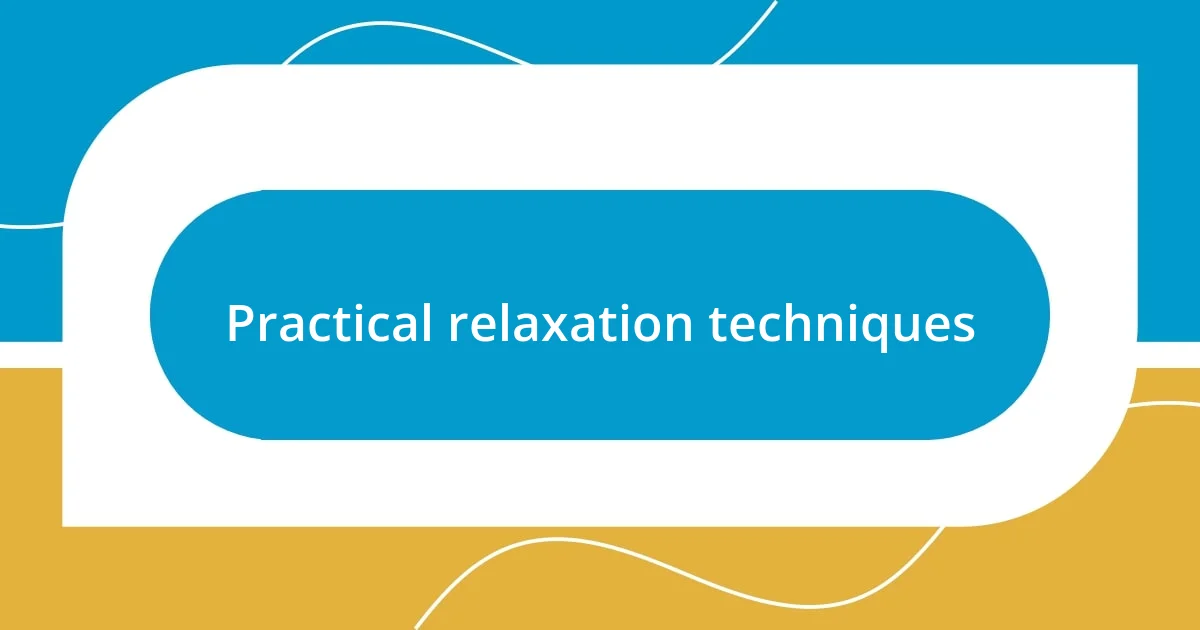
Practical relaxation techniques
Finding relaxation techniques that resonate with me has been vital in my stress management toolbox. One of my favorites is deep breathing. I remember a particularly hectic day at work when the pressure felt unbearable. I stepped outside for just a few minutes and took a few slow, deep breaths, feeling the air fill my lungs and then gently release. That simple, mindful moment shifted my perspective. Have you ever tried deep breathing during a stressful moment? It really brings a sense of calm and clarity.
Another technique I’ve found incredibly beneficial is progressive muscle relaxation. This technique involves tensing and then relaxing each muscle group in the body, which helps dissipate tension and promote a sense of ease. I discovered it one afternoon after a long week; my neck and shoulders felt like they were carrying the weight of the world. As I slowly worked my way through my body, feeling each area loosening up, it was as if the stress floated away. Have you ever experienced that sensation of release? It’s quite liberating.
Finally, don’t overlook the power of nature. I make it a point to take short walks outside whenever I can, even if it’s just around the block. These moments in fresh air rejuvenate me. I remember one rainy day; instead of hiding inside, I donned my jacket and splashed through puddles in my neighborhood. That simple connection with nature, despite the weather, lifted my spirits significantly. Isn’t it fascinating how a little bit of nature can alter our mood so profoundly? Finding practical methods like these has genuinely transformed how I navigate the ups and downs of daily stress.
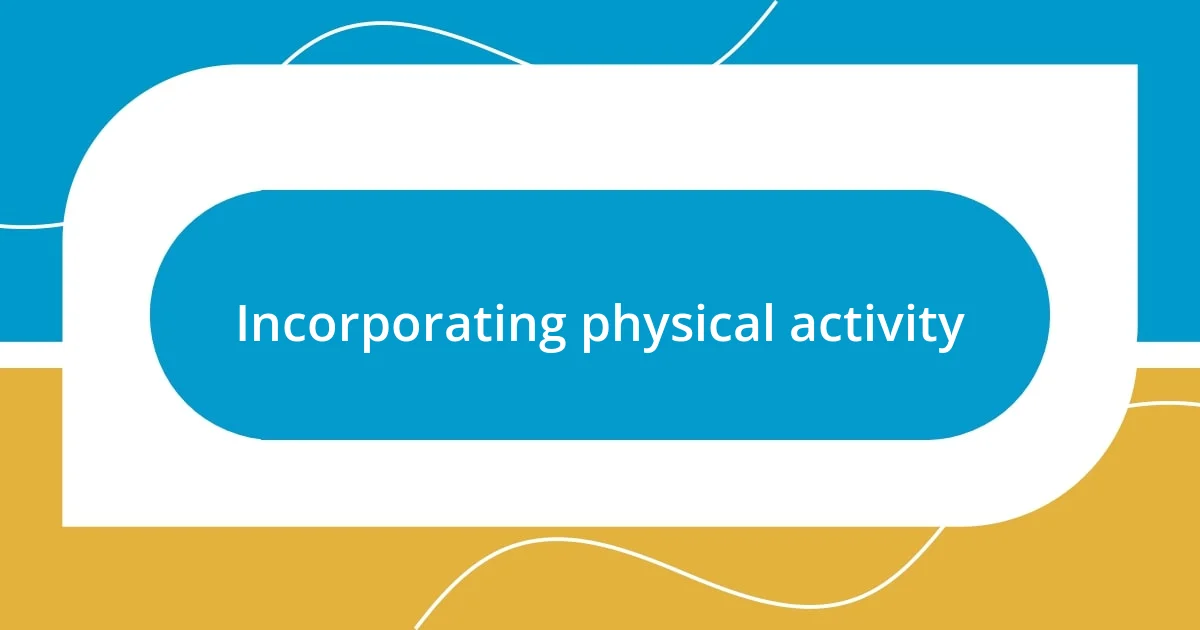
Incorporating physical activity
Incorporating physical activity into my daily routine has been a game changer for stress management. When I began to intentionally include movement, whether it’s a brisk walk or a 15-minute yoga session, I noticed an immediate shift in my mood. There’s something about the release of endorphins that truly elevates my spirits, don’t you find it fascinating how a little movement can dramatically change our outlook?
I remember a particularly stressful week when deadlines loomed over me, and I couldn’t shake off the heaviness. On a whim, I decided to turn on some upbeat music and dance in my living room for a few minutes. It felt silly at first, but by the end, I was laughing and refreshed! That simple act cleared my mind, allowing me to return to my tasks with a renewed focus. Have you ever tried a quick dance break? It’s surprisingly effective!
Another thing I’ve learned is to listen to my body. Some days, a high-intensity workout feels invigorating, while other days, a gentle stretching routine is all I need. After a long day, I often find solace in a slow bike ride around my neighborhood, appreciating the sunset colors. It becomes a meditative experience, allowing me to process my day while soothing my stress. How do you reconnect with your body when life gets overwhelming? Finding that sweet spot between effort and ease has made a significant impact on my overall well-being.
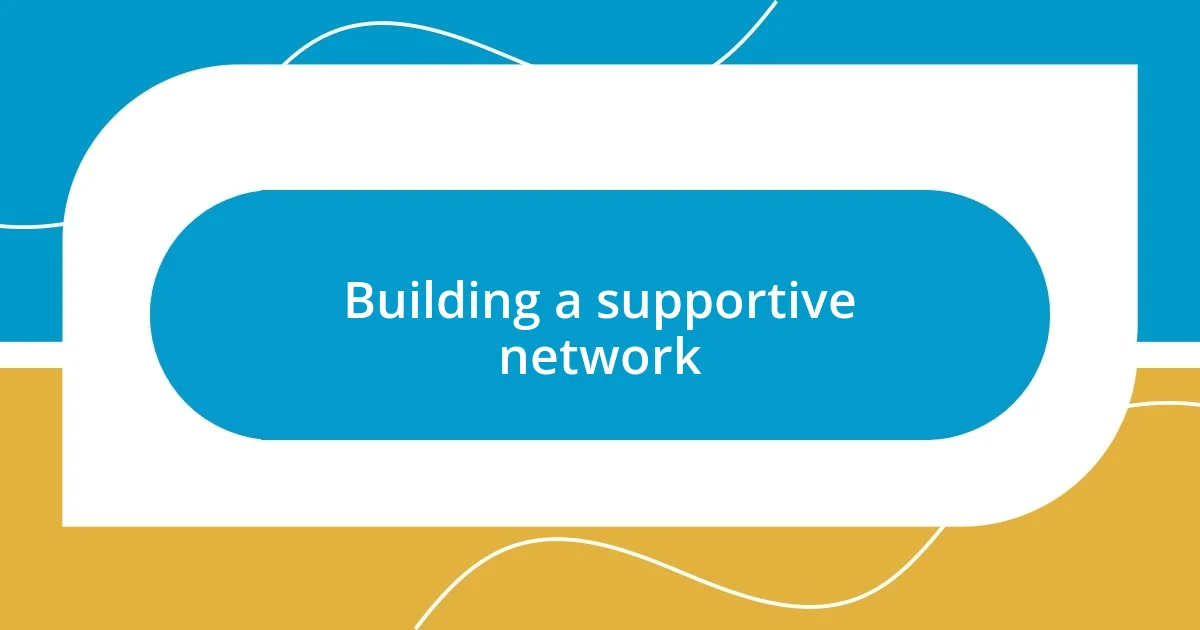
Building a supportive network
Building a supportive network has been one of the most crucial aspects of managing stress in my life. I’ve always believed that people can be an incredible source of strength when things get tough. Recently, I went through a challenging period at work, and reaching out to my friends made all the difference. Just hearing their voices and sharing my worries lifted a weight off my shoulders. Have you ever felt that sense of relief from simply talking it out?
I often find solace in my close-knit circle during stressful moments. Last month, I invited a couple of friends over for a casual dinner and a chat. As we gathered around the table, we shared our challenges and laughed at the absurdity of our situations. In that light-hearted atmosphere, it struck me how much support can come from just being together. Isn’t it remarkable how connection can create such a powerful buffer against stress?
Creating a supportive network isn’t just about having people around; it’s about nurturing those relationships. I make sure to check in with my friends regularly, whether through a quick text or coffee catch-ups. It strengthens our bond and ensures we’re there for one another when life throws curveballs. How do you stay connected with your support network? For me, maintaining those ties has become a vital part of my routine, offering both comfort and perspective when I need it most.
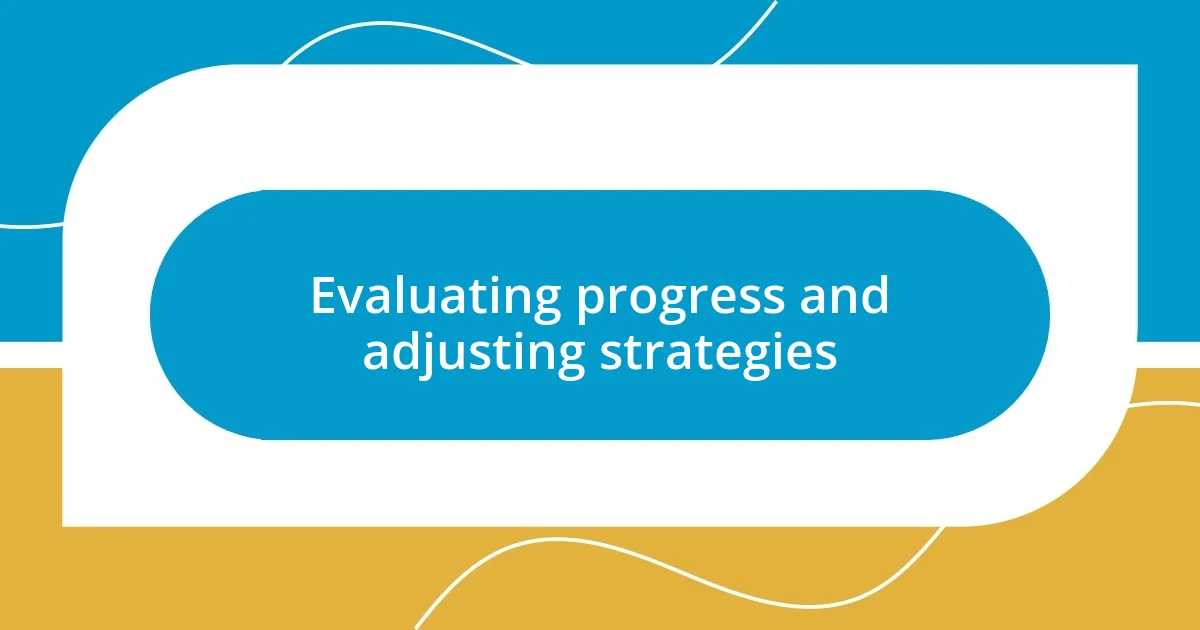
Evaluating progress and adjusting strategies
Evaluating my progress with stress management is an ongoing journey. I often set aside time each week to reflect on what strategies have been working and which haven’t yet clicked. This self-assessment allows me to take a step back and recognize patterns—like realizing that when I prioritize sleep, my stress feels more manageable. Have you taken the time to assess your own progress?
Adapting my strategies is crucial, especially when I notice that stress isn’t subsiding. For instance, I once felt overwhelmed despite my usual practices. So, I tried journaling about my feelings each day. It surprised me how simply putting pen to paper provided clarity, giving me insights into my stressors. Have you ever found empowerment through self-reflection?
Being flexible with my approach is key. I understand that what works one week might not be effective the next. During a particularly hectic season, I discovered that integrating short meditation sessions into my routine was transformative. These moments of pause helped ground me. How do you adjust your strategies when faced with new stressors? It’s all about finding that balance and evolving as needed.












